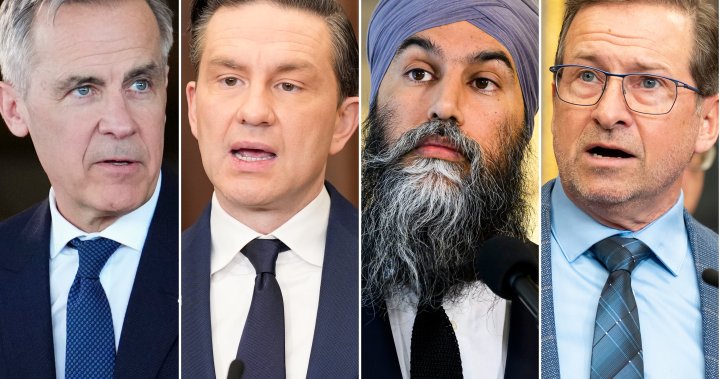If the ballot box question is change, Canadians were treated to four federal leaders Thursday night promising this time will be different.
Three of those leaders did everything they could to connect Liberal Leader Mark Carney to former prime minister Justin Trudeau, while Carney did his best to distance himself from his predecessor’s legacy.
“Justin Trudeau isn’t here,” Carney said during a tense exchange with Conservative Leader Pierre Poilievre.
“The way you judge someone, in my view, is how they act. What they do when they have responsibility.”
Carney entered into the night as the clear frontrunner, and that was reflected in the attention he got from Poilievre, NDP Leader Jagmeet Singh and Bloc Québecois Leader Yves-François Blanchet. He needed to avoid mistakes to protect the Liberal lead in national polling.
But his rivals were unwilling to let the newly-minted prime minister shed the legacy of a decade of Liberal rule.
Poilievre, who spent years laying track to fight an election against Trudeau and the carbon tax — two issues now off the table for the electorate — entered into the night as the underdog despite his party having led in national polls for months.
Poilievre was keen to connect Carney’s economic advisory role to Trudeau’s legacy.
“The choice in this election is after a lost Liberal decade of rising costs and crime and a falling economy under America’s thumb, do we want to elect them to a fourth term? Or do we want change?,” Poilievre asked towards the close of the debate.

Get breaking National news
For news impacting Canada and around the world, sign up for breaking news alerts delivered directly to you when they happen.
“In retrospect, you look back on the Liberal decisions that you advised Justin Trudeau. Will you look at the camera in the eye and apologize to the many people who suffered as a result of the inflationary policies that you advised Justin Trudeau to implement?”
“Twice I was a central bank governor,” Carney shot back, referring to his time as the governor of the Bank of Canada and the Bank of England.
“And in both cases, if I may, in both cases when I was responsible for inflation, inflation was less than two per cent … That is the kind of success that I can deliver for this country coming on this crisis.”
The candidates arrived at the only English debate in the shadow of U.S. President Donald Trump and his chaotic tariff war against the world. No candidate had a decisive performance in the French-language debate Wednesday evening.
Poilievre — until only a few weeks ago the odds-on favourite to become Canada’s next prime minister — has seemingly shifted his tone from hellfire to hope.
“I was the leader of the Opposition. Now I’m preparing to become prime minister,” Poilievre told the popular Québec television show Tout le Monde en Parle earlier this week.
“It’s the time to present hope.”
Carney, on the other hand, has led a campaign that seems to play up boring — or, more charitably, reassuring.
“Canada has to create other options, new international trade partners, and that’s what I promise,” Carney said during Wednesday’s French language debate, referring to the Canada-U.S. relationship.
Singh, with his party trailing badly in national polling, was just looking to get a seat at the table.
With the Greens disinvited from the independent debates commission’s nights, it was those three national leaders squaring off to convince Canadians they were the right person to lead the country through chaos.
The Poilievre Conservatives’ once-formidable lead — a double-digit percentage point advantage over the Justin Trudeau-led Liberal Party — withered over the last few weeks, in one of the most stunning reversals in modern Canadian politics.
The race now appears to be Carney’s to lose. As of Thursday, poll aggregator 338canada.com projected the Liberals to win 193 seats — well within comfortable majority territory — and the Conservatives 121, roughly where the party was at in their election losses of 2015, 2019 and 2021.
The website, which crunches numbers based on publicly-available national polling, put the Bloc Québecois at 20 seats and the New Democrats at eight, which would represent a stunning wipeout for the progressive party.
The polling numbers have been largely static since Carney took over as prime minister in March. But both the Liberals and Conservatives have pledged to release their fully-costed platform in the coming days — the first major policy development in the campaign that has the chance to move the needle.
© 2025 Global News, a division of Corus Entertainment Inc.






